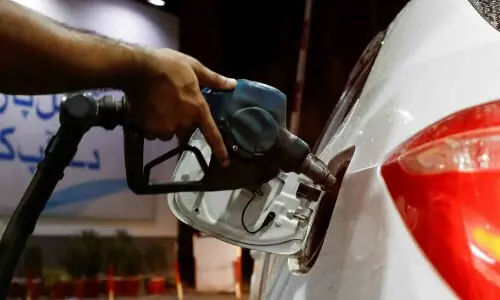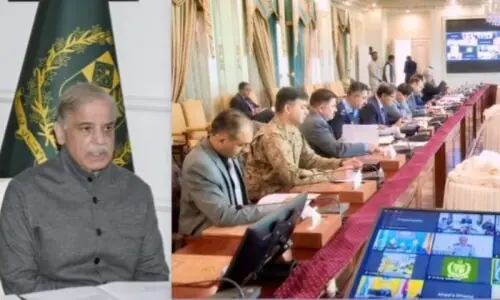PAKISTANIS just can’t get enough of America. For 10 days we were transfixed on the outcome of the US election. With the tension released following confirmation the Biden campaign had triumphed, we turned our attention to the US embassy’s official Twitter handle.
The retweet of a prominent PML-N leader’s post about Prime Minister Imran Khan’s ostensible similarities to Donald Trump, including a prediction that the former will follow the latter out of office, spiralled into what some PTI ministers described as a diplomatic crisis. It will, of course, blow over soon, this hardly being the first time US diplomats have meddled in Pakistani politics.
A short journey into the historical record is instructive. The US ambassador was one of the only people in Pakistan to know in advance of the 1958 coup that led to the installation of Pakistan’s first martial law regime. In his explosive memoirs written from prison after the 1977 coup, Zulfikar Ali Bhutto explicitly accused the US embassy of supporting the military putsch against him. Through much of the late 1970s and 1980s, the US embassy was a conduit for the covert arms that flowed into Pakistan for so-called holy war in Afghanistan.
Fast forward to the post-9/11 period and there have been numerous high-stakes encounters in Pakistan involving the US embassy, not least the Raymond Davis episode, and the events that led to Osama bin Laden’s death in Abbottabad.
The US and Pakistan can’t seem to get enough of each other.
Quite simply, if Pakistanis can’t get enough of the US, the latter also can’t seem to get enough of Pakistan. Both sides seem to revel in selective outrage; it is the epitome of what one would call a love-hate relationship.
Mind you, the two countries are hardly monoliths, and are arguably stuck in love-hate relationships within their own polities. As commentators have noted, Trump’s defeat at the polls should not take away from the fact that 70 million Americans still buy into his message. There is even concern that he may yet attempt a ‘coup’ to stay in the White House past Jan 20.
Meanwhile, Pakistani politics is in one of its acutely conflict-ridden phases, a fact likely to be reflected in the Gilgit-Baltistan Assembly election this Sunday. Deprived of any real decision-making power over natural resources and other matters of public interest, GB’s politicians generally put in their lot with the federal government so as to secure the patronage of the establishment. But Bilawal Bhutto-Zardari and Maryam Nawaz have dedicated time and energy to campaigning in GB this time around, and notwithstanding major manipulation by the powers that be, the PPP and PML-N will have not insignificant representation in the GB Assembly.
Just like it would be incorrect to assume that the impending Biden presidency necessarily heralds change — on climate change, immigration, domestic economics and foreign policy — we have to wait and see whether the PPP and PML-N are committed to undoing the colonial logics of statecraft in GB by continuing to struggle for the release of political prisoners like Baba Jan; changing the instrumental nature of the Pakistani state’s relationship to GB’s ecology and status as tourist haven; and delinking the fate of GB’s people from geopolitics of the China-India border.
Which brings me back to America, Pakistan and our love-hate relationship. Events of recent days both bring into focus the role that individuals play in history, and the limits that abiding structures of power place upon them. Both in America and Pakistan, and, indeed, much of the world, we associate politics with personalities. It is easier to attribute what are otherwise complex and opaque workings of power with the conduct of individuals, rather than classes, institutions, genders, states or even empires.
If nothing else, the world’s experience of Trump has clarified that demagogues can at least temporarily unhinge some structural logics. But this does not mean that such demagogues necessarily determine the longer-term ebbs and flows of ties between states, and, indeed, politics within them. Imran Khan, for instance, would like to have much more influence in charting both domestic and foreign policy than he actually does.
Pakistan and the US are divided societies, with authoritarian and elitist tendencies. Just like American racism and imperialism play out over time, at home and abroad, so deeply ingrained logics of ‘national security’, religious exceptionalism, class and gendered power are reproduced daily in our establishment-centric system.
In this sense, the US is Pakistan’s mirror, no matter how much we love to hate it. If we want an end to imperialism, we must speak up against all of its manifestations. And also against the tyrannical, unjust and inegalitarian logics of power within Pakistan that imperialism has propped up for decades, not least of all ‘overzealous’ personnel of the state for whom any form of democracy is anathema.
The writer teaches at Quaid-i-Azam University, Islamabad.
Published in Dawn, November 13th, 2020






























